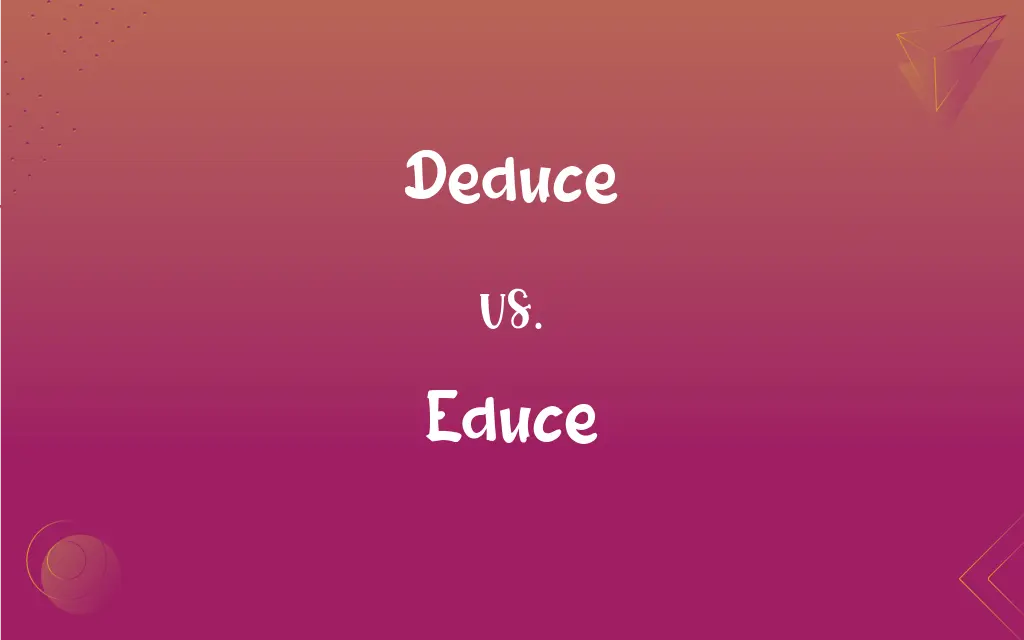Deduce vs. Educe: What's the Difference?
Edited by Janet White || By Harlon Moss || Published on December 8, 2023
Deduce means to infer conclusions from known facts, while educe means to bring out or develop something latent or potential.

Key Differences
Deduce is a process of logical reasoning, arriving at a conclusion based on available evidence or premises. Educe, in contrast, involves drawing out or developing something that is latent or not immediately apparent.
In deducing, one typically uses specific details to infer a general conclusion. Educing often means bringing out qualities, ideas, or possibilities that are inherent but not yet fully realized or expressed.
Deduction is commonly used in scientific, mathematical, and detective work, requiring analytical thinking. Eduction is more about eliciting or developing potential, often used in educational, psychological, or creative contexts.
Deduce can also mean to understand something based on the information given. In contrast, educe can refer to the process of guiding or facilitating the development of abilities, traits, or ideas in a person or group.
Deduction often involves a clear, logical pathway from premises to conclusion. Eduction, however, might involve more subjective or creative processes, such as nurturing a skill or realizing a concept.
ADVERTISEMENT
Comparison Chart
Definition
Infer conclusions from known facts.
Bring out or develop something latent.
Process
Logical reasoning from specific to general.
Drawing out or nurturing inherent qualities.
Usage Contexts
Scientific, investigative, analytical.
Educational, psychological, creative.
Nature
Analytical and often objective.
Subjective, nurturing, or developmental.
Outcome
Arrival at a logical conclusion.
Development or realization of potentia
ADVERTISEMENT
Deduce and Educe Definitions
Deduce
To infer by logical reasoning.
From the evidence, she deduced that the suspect was lying.
Educe
To develop or draw out a response or reaction.
The therapist was able to educe feelings the patient had repressed.
Deduce
To derive as a conclusion from something known.
The scientist deduced a new theory from his experiments.
Educe
To bring out or develop something latent.
The teacher's methods helped to educe the students' creativity.
Deduce
To reach a conclusion based on facts.
He deduced the answer to the puzzle after a few attempts.
Educe
To draw out the inherent qualities of someone or something.
Her coaching style was effective in educing the team's potential.
Deduce
To trace the origin or derivation of.
The linguist deduced the origins of the word from ancient texts.
Educe
To elicit or extract information.
The discussion was designed to educe honest opinions from the participants.
Deduce
To understand something from the information given.
She was able to deduce the theme of the novel quickly.
Educe
To draw or bring out; elicit.
Deduce
To reach (a conclusion) by reasoning.
Educe
To infer or work out from given facts
Educe principles from experience.
Educe
To direct the course of (a flow, journey etc.); to lead in a particular direction.
Educe
(transitive) To infer or deduce (a result, theory etc.) from existing data or premises.
Educe
(transitive) To draw out or bring forth from some basic or potential state; to elicit, to develop.
Educe
To isolate (a substance) from a compound; to extract.
Educe
(transitive) To cause or generate; to bring about.
Educe
An inference.
Educe
To bring or draw out; to cause to appear; to produce against counter agency or influence; to extract; to evolve; as, to educe a form from matter.
The eternal art educing good from ill.
They want to educe and cultivate what is best and noblest in themselves.
Educe
Deduce (a principle) or construe (a meaning);
We drew out some interesting linguistic data from the native informant
Educe
Develop or evolve, especially from a latent or potential state
Educe
To bring to light something hidden or unseen.
The archaeologist's work helped to educe new insights about ancient civilizations.
FAQs
Do detectives use deduction?
Yes, detectives use deduction to infer conclusions from clues and evidence.
What does it mean to deduce in science?
In science, to deduce means to draw conclusions from empirical evidence or logical reasoning.
How is educe used in education?
In education, educe is used to develop or bring out the potential in students.
Is deducing always accurate?
Deductions can be accurate if based on correct premises and logical reasoning.
Can deduction be used in everyday life?
Yes, deduction is often used in everyday reasoning and problem-solving.
Is educe related to personal development?
Yes, educe often pertains to personal development and growth.
Can educe be used in therapy?
Yes, therapists can use educative techniques to draw out emotions or thoughts.
How does educe relate to creativity?
Educe can involve drawing out or nurturing creative potential.
Can educe be applied in team building?
Yes, educative techniques can be effective in team-building activities.
Can educe be used in conflict resolution?
Yes, educative methods can help in eliciting underlying issues in conflicts.
Can deduction lead to new discoveries?
Yes, deduction can lead to new insights or discoveries, especially in research.
What skills are needed to deduce effectively?
Effective deduction requires analytical thinking and logical reasoning.
Are there tools to help with deduction?
Yes, there are logical frameworks and methodologies to aid in deduction.
Is deduction a natural skill or learned?
Deduction can be both a natural skill and enhanced through practice and learning.
What role does educe play in art?
In art, educe plays a role in bringing out artistic expression and creativity.
Is educe used in leadership training?
Yes, leadership training may use educative methods to develop skills.
How does deduction work in mathematics?
In mathematics, deduction involves deriving conclusions from axioms or theorems.
Can deduction be flawed?
Yes, deductions can be flawed if based on incorrect information or faulty logic.
Is educe important in counseling?
Yes, educe is important in counseling to draw out clients' thoughts and feelings.
How does educe contribute to innovation?
Educe contributes to innovation by developing latent ideas or approaches.
About Author
Written by
Harlon MossHarlon is a seasoned quality moderator and accomplished content writer for Difference Wiki. An alumnus of the prestigious University of California, he earned his degree in Computer Science. Leveraging his academic background, Harlon brings a meticulous and informed perspective to his work, ensuring content accuracy and excellence.
Edited by
Janet WhiteJanet White has been an esteemed writer and blogger for Difference Wiki. Holding a Master's degree in Science and Medical Journalism from the prestigious Boston University, she has consistently demonstrated her expertise and passion for her field. When she's not immersed in her work, Janet relishes her time exercising, delving into a good book, and cherishing moments with friends and family.







































































